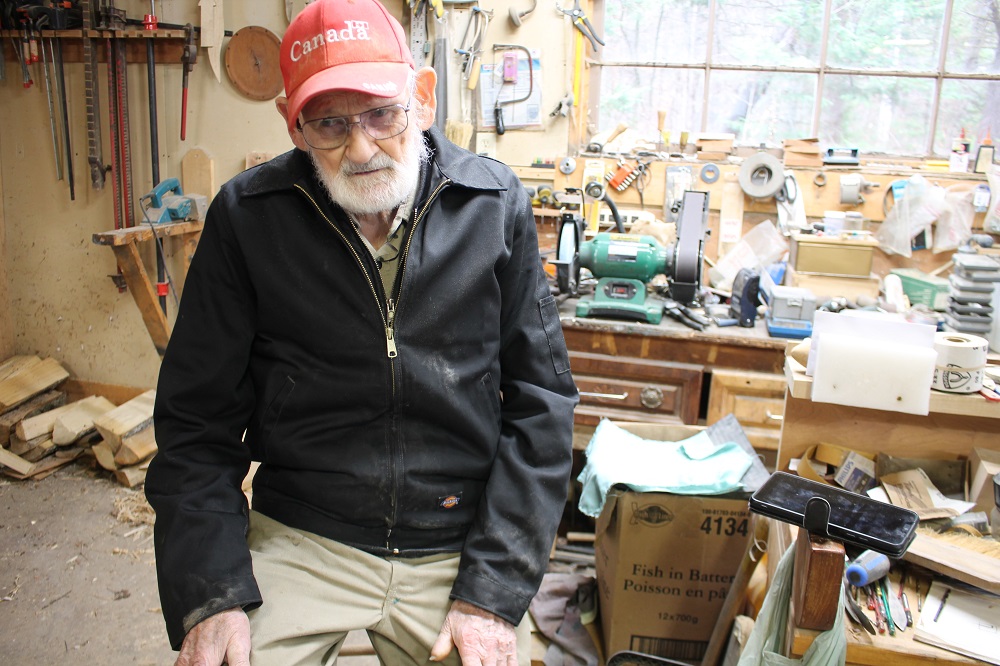Kim Switzer and partner, Brad Archer, are enjoying what they are calling ‘Ray days’ – working with legendary canoe and paddle builder, Ray Kettlewell.
For the past year, the partners have been travelling to Kettlewell’s shop near Kinmount to learn how to build cedar canoes.
In a large shed, heated by a wood stove, and filled with tools, Switzer and Archer lean over a canoe-in-the making, steaming cedar ribs to curve them around a form, and then tacking them down with specialized nails.
Kettlewell looks on, occasionally offering a word of advice, but mostly letting the couple do the work themselves.
Kettlewell knows a thing or two about the trade. He’s been involved with canoeing and wood most of his life.
Prior to 1970, he worked in the hardwood lumber industry; logging and managing a sawmill and dry kiln in southwestern Ontario.
Much of his spare time was spent paddling, though, on his own and guiding groups of adults and children on canoe trips. Kettlewell earned a canoe instructor’s certificate in 1973 and 15 years of marathon canoe racing earned him a canoe full of trophies.
He began making paddles in 1970 to supply himself with the kind of paddles he wanted. He had access to the best hardwood and years of knowledge of wood. Since 1977, making paddles had been Kettlewell’s full-time occupation until retirement. After having purchased a 130-year-old Chestnut form canoe from New Brunswick, his focus shifted to canoe building and he points to the 20th canoe he’s built up on a rack. He reckons it takes 200 hours to build one by hand.
At 89, going on 90, it’s time to pass on his knowledge. So, when Switzer came calling last fall, and the two shared a connection over all things canoeing, it made sense for Kettlewell to take her under his wing.
Switzer tells the story of how she learned about, and wanted to buy, a famous Ray Kettlewell paddle but she couldn’t lay her hands on one. When she learned the inventor lived just down the road, she called and was invited to come to the shop.
Deep passion
“We talked for over two hours, about the passions that light us up, like the feeling of being one with your canoe. Only a select few share that real deep passion for paddling and being in a wooden canoe. And then I saw he was building these boats. I came looking for a paddle but then it was like, wait a minute, what’s this? I said I want to learn how to build these. I want to be involved in this. I want to know how to do this. And the next thing I knew, I’m down here building and this has been an amazing journey, so many skills, so many lessons to be learned. And I really hope to carry this on.”
Kettlewell is equally pleased since, “there’s nobody really passing this on that I know of. I know some other builders, but they’re not passing it on because probably they can’t find anybody to do it. It’s a dying industry because everybody thinks fibreglass does the job. With cedar, hand-built canoes, you’ve got to have many, many skills.”
Looking at Switzer and Archer planking the canoe, Kettlewell adds, “they’re interested. I don’t know whether they’re interested enough to make a career out of it, but at least there’s knowledge being spread.”
Switzer has a yellow canoe that she saved from the landfill, however, she said the canoe has in many ways saved her life, helping her to heal from a myriad of losses.
“So, this is also going to help me keep my yellow boat alive, which is a big part of who I am. Learning how to build boats and hopefully passing on these skills and knowledge to others. I want to keep doing this. I want to build a boat with my son, Memphis, because he’s got that passion. And he’s been able to come down here. Ray has welcomed him into the shop and he’s been weaving seats and tacking planks, too. If we don’t have people that want to teach and pass on these skills, it’s going to die.”
Switzer adds no one has ever wanted to teach her woodworking, but Kettlewell has been “amazing” and pushed her beyond her comfort zone. For example, using power tools and doing things she’s never done before. It’s given her confidence.
“I’m just in awe of this whole experience. It’s lit me up in so many ways.”
Archer had a shop and carpentry skills so the two make a good team. He says it has been an interesting experience, sharing how his family owned the Matabanick Cottage Resort on Boshkung Lake, with its large boathouse. “My grandfather used to build boats, and did a lot of work on canoes. I don’t know if they actually made any canoes or not, but I know they made cedar-strip row boats and dippy boats.”
Switzer can’t wait to get the canoe in the water, even if there is some ice. She finds solo paddling slow, calming and steady. It brings her peace and joy.
Switzer adds her ‘Ray days’ may be unpaid, but they are priceless.
“This isn’t something that we would put a value on. And I think that was one of the questions that Ray asked me. What would you value this at… the information, the knowledge, the skills, the craftsmanship, the time, the energy? All of that is priceless.”





